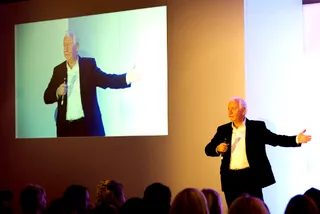
The Ray Hammond Q&A Part 2
Ray Hammond is a world-renowned futurologist, technology analyst and writer whose books have been published in 44 countries in 23 languages. For 35 years he has been studying the major trends that will shape the world and here, in the last of two parts, Ray takes questions from the Speakers Corner team on that nebulous realm - the future - and what it may hold for us.
Adam from Sales:
With the increased development in AI and robotics, how close are we to computers having consciousness? And how long from that point before they destroy us all – Terminator style?
A sobering – and very relevant question. Some futurists/futurologists suggest that we are approaching the “technological singularity” – the point at which computers become as capable at problem-solving as humans. I believe this to be the case.
Whether or not this will result in the emergence in machines of what we think of as consciousness is unknown – and it may be that our concerns about “consciousness” are wrong; this may be a question unique to the human point of view. I addressed the concept of consciousness emerging in the world’s computer networks in my novel Emergence (published in 2001, story set in 2035).
The reason the point at which computers become as capable as humans is referred to as a singularity is because, rather like the singularity of a black hole in space, this is a point beyond which it is not possible to imagine the future (we can see no information beyond that point).
We can’t speculate about the future beyond the singularity because once computers are as capable of problem-solving as humans, their development will continue to be exponential (unlike linear human development). Within a very short time computers will be twice as capable as humans, then four times as capable, then eight times as capable and so on. Who can imagine what such forms of networked intelligence might be able to achieve?
Professor Stephen Hawking and a number of Silicon Valley luminaries have warned that humankind must address urgently the issues posed by the Technological Singularity ( as have I on Youtube ). Basically, the question is, will these super-intelligent machines be our slaves or our masters? Or are they just an evolutionary extension of humankind?
When will the Technological Singularity occur? Some futurists and computer scientists suggest as early as circa 2030. Other suggest 2050, some say never. My judgement is that it will occur before 2050.
Slaves, masters or a successor species? We have the choice. For now.
The Terminator: Armed Artificial Intelligence. Picture courtesy of Wikipedia: Theatrical release poster.
Nat from Marketing:
When you watch Hollywood sci-fi, do you find it all ridiculous?
Depends upon the movie: Interstella was brilliant, X-Men less so. The first job of a movie is to entertain, not to attempt to be factually accurate. I’m usually able to suspend disbelief to enjoy a good movie. Having said that, the BBC’s recent Dr Who episodes and Channel 4’s current fantasy/sci-fi series Humans defeat me.
I’ve written sci-fi novels myself (published by Macmillan) and in fiction the writer is free to explore ideas and possibilities way beyond the sort of thing that can be contemplated in professional futurology.
I regard my fiction as a “laboratory” for ideas about the future – a lab in which I don’t have to worry too much about probability, or responsibility.
Science fiction has an important role in society, alerting us to future possibilities as well as providing entertainment. Because we didn’t have an appropriate word for them, we described the first futurologists as science fiction writers. Jules Verne, H.G. Wells and Aldous Huxley all wrote what we called sci-fi, but their great works turned out to be wonderfully prophetic examples of pioneering futurology.
Jason from Marketing:
How important is it for us to colonise other planets and how long do you think it will take?
It is vital that humans (or, more likely, our AI descendants) colonise other planets as our long-term survival can’t depend on a single planet. Earth is too vulnerable to asteroid strikes and other major celestial incidents – we need back-up habitats for long-term survival, and many of them.
In the short term (the next four decades or so) there may be attempts to colonise the Moon and Mars with humans, but these expeditions are likely to be so risky and expensive they will prove unsustainable.
Unfortunately human biology is not suited to long-distance space travel and extra-terrestrial survival so in the long-term it won’t be we humans in our present form who head out into deepest space.
The future belongs to our successors; super-clever, self-replicating machines which embody the human spirit which will spread through the solar systems to become the colonising species of the universe.
An Amersham Inspired Alien Landscape
Picture courtesy of Flickr. Rectory Hill sunset, Amersham, Buckinghamshire, UK. by Eric Hossinger. Transformed by J.Smith
Have an enquiry?
Send us a message online and we'll respond within the hour during business hours. Alternatively, please call us our friendly team of experts on +44 (0) 20 7607 7070.
